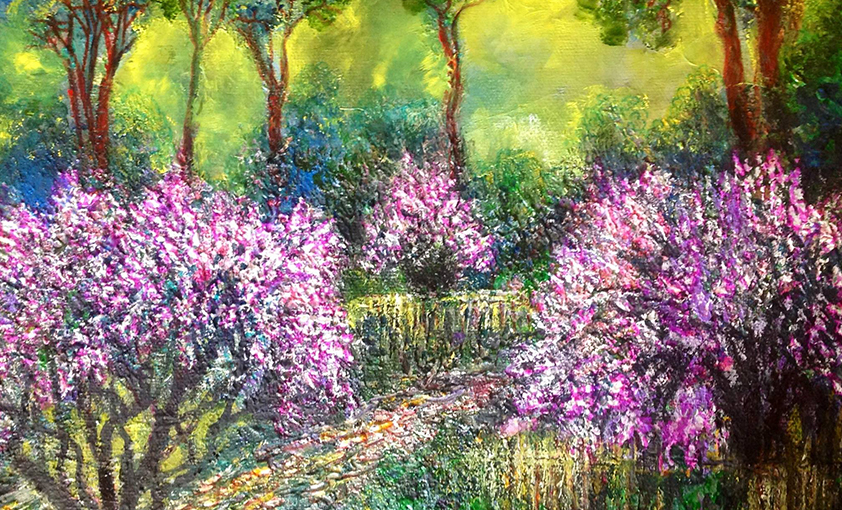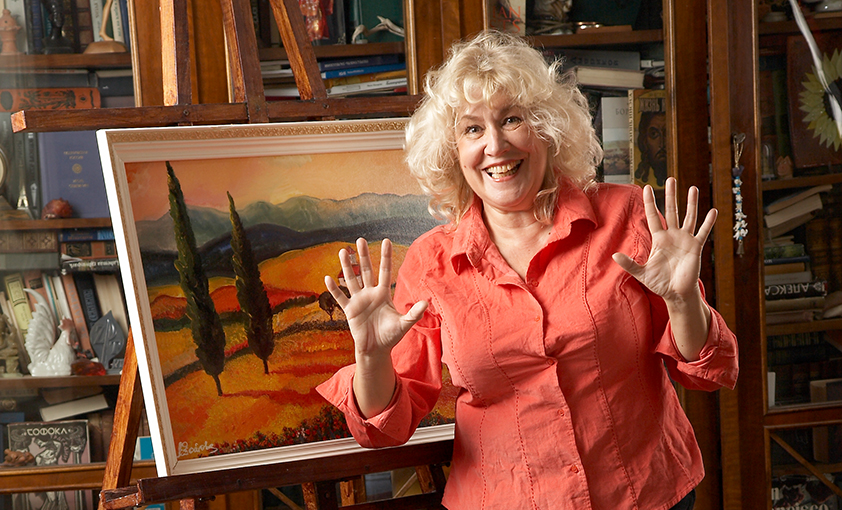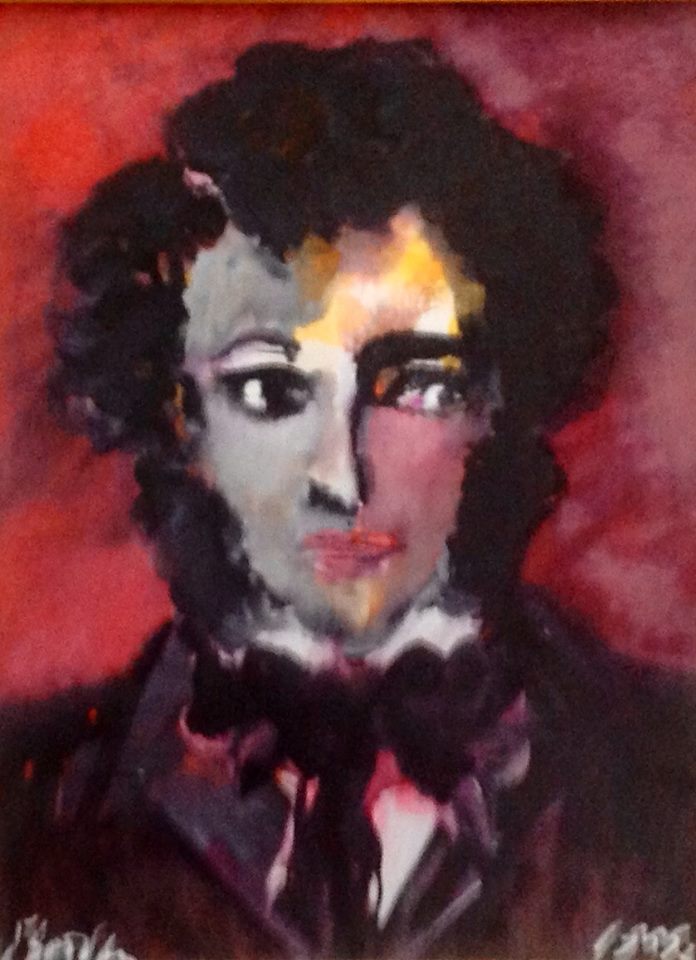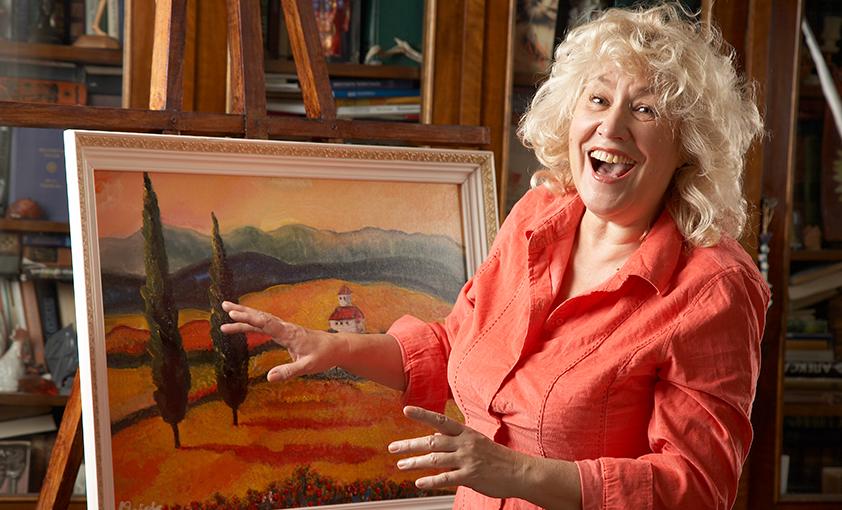Savills, Nikolay Tarasenko, Moscow, 2019
What is talent? In antiquity, a talent was a monetary unit. It acquired a new meaning thanks to the biblical parable, which told of a certain owner who presented his workers with coins (talents) when he left on a long journey. One got five talents, the other two, and the third got one. The first two employees invested their money in business and multiplied it. The third, without further ado, buried his talent in the ground for safekeeping. When he came back, the owner praised the first two workers, and kicked out the third one and gave his coin to another person. This is how the popular expression to "bury your talent" appeared.
It is no secret that from the start each person is talented in his own way. But not all of us manage to reveal, and most importantly, to skillfully utilize this gift from God. Our today's meeting is with a woman creator, who uniquely uncovered her artistic talent, came as close as possible to understanding her own essence and purpose in life.
Business Card. Liudmila Ivanovna Zotova. Born and lives in Moscow. Has two higher education in the humanities. Member of the professional and creative Union of Artists and Graphic Artists of the International Federation of UNESCO Artists. UN Prize winner. Over the past decade, she has held more than two hundred personal exhibitions in Russia and abroad. Her paintings are held in museums, private collections of presidents and ambassadors, actors and writers. Zotova's canvases have received recognized in over 50 countries around the world.

Savills: Liudmila, judging by your biography, there was a stretch of about 20 years of your life, which - forgive me for being so straightforward - you gave to paperwork. You were busy with the minutes of congresses and sessions of the Supreme Soviet of the USSR (Parliament), preparing documents for signing by the first persons of the state ... And then suddenly a high-ranking civil servant like yourself began to paint. What happened?
Liudmila Zotova: Let's take it one thing at a time. First, I was in constant communication with a wide range of people, from local deputies to the President of the USSR Mikhail Gorbachev. It was a real school of life. Secondly, I would not compare working in the Kremlin with doing useless paperwork. My colleagues and I were, in one way or another, involved in compiling documents of utmost importance, which largely determined the fate of a huge country. I had professionals of the highest level working next to me. Very educated, smart, thinking people. It is from them that I learned to treat the work you are assigned with extreme responsibility.
Savills: I was fortunate enough to work as an accredited journalist in the country's parliament in those same years. I agree with you, it was an interesting time of changes. Only we would realize more and more that the announced perestroika would not lead to a any real improvement in life.
Liudmila Zotova: it was especially clearly visible from the inside. By the beginning of the 90s, I reconsidered a lot of things and even once said to my husband: "The country will be gone." The decisions that were made did not work, a huge wave of paperwork would simply go into a trashcan. More and more often I would ask myself a question - "Why should I, a bona fide person, work in vain?!"
I remember the session of the Presidium of the Supreme Soviet on the issue of Nagorno-Karabakh in detail. I had access to classified information, and I knew the exact death toll of the conflict. Then I realized for the first time - a war had begun in my country. During a break in the meeting I went down to my office feeling completely frustrated. There was a stack of papers with the logo of the Supreme Soviet on the table. I tried to draw something on the back of the paper with a hard pencil. I did not like it. I took a soft cosmetic pencil and began to run it over the paper - it did not feel right wither. A set of multicolored cosmetics from Lancome caught my eye. I don't know how and why, but I began to apply the luxurious cosmetics on a snow-white sheet with my finger. This process has wholeheartedly enthralled me.
I was almost late for the second part of the session. I was sitting there feeling so happy, and sort of looking at myself from the side. And I was different! This is how my second life began.
Savills: What did it result in, an abstract picture Kandinsky style?
Liudmila Zotova: This drawing is long gone, but I remember that cosmetic subject well. It was a winter landscape. On the right side there was a forest and a slope. Sunrise, frozen river. A horse is walking on the ice. The horse turned out to be of impeccable beauty and grace, as if all my life I did nothing but draw horses.
After that, I became infatuated with the painting process! I continued to work in the Kremlin, but whenever I came home I would create. Sometimes without sleep or rest. In 1991, my colleagues and I were outstaffed. Perhaps, I was the only one of all the employees who was incredibly happy about this.
Savills: Your experiences have become one of the reasons for the inner rebirth. But there were probably other prerequisites for rethinking your purpose in life?
Liudmila Zotova: I have no art education. But I have always been creative. I helped the children to design wall newspapers for school, I sew suits for them, outerwear, I knitted. It was easy for me to restore furniture on our dacha. My hands, as the song says, were never ones for boredom.

Why else did my life zigzag happen? In the 90s that were very difficult here, I decided to prove to myself and my family that one should not lose heart and despair. There is only one real reason people don't succeed - they give up early. Difficulties and failures are all temporary troubles. But if you throw your hands up, stop fighting, then you would not even have a chance of success. I wanted to become an artist who is in high demand not for the sake of fame or to satisfy some ambitions.
I just love people and I love life. I want to spread joy to everyone, to share my desires, dreams, and feelings.
Savills: I know that your hands and your fingers are the hallmark of the artist Zotova. You paint pictures using the so-called "finger painting" method. Can you really do without brushes?
Liudmila Zotova: Sometimes I use brushes, but mostly I paint with my fingers. By directly touching the canvas, I feel like a part of it. Stroke by stroke you see a world full of color being born at your fingertips.
Savills: Liudmila Ivanovna, be hones, do you have a sense of adventure?
Liudmila Zotova: Apparently, yes. But it is a healthy one. I recall a story that happened at my personal exhibition in Brussels. On the 200th anniversary of Pushkin’s birth there was an offer to participate in the anniversary events that took place in the Belgian capital. At that time, I did not have a single picture associated with Pushkin. I sat thinking - "Being a philologist, I must honor my beloved poet on his birthday!" I got the offer on May 5, and the exhibition opened on June 6, 1999, on the poet’s birthday. In less than a month, 25 canvases were born on the subject. The opening day at the Russian House in Brussels went off with a bang. The paintings sold well. The portrait of Pushkin was especially popular.
Savills: So did “our everything” (reference to Pushkin) stayed in Belgium?
Liudmila Zotova: How could you say that?! I viewed selling Pushkin as the same as selling out my Motherland. Alexander Sergeevich returned home. This is how I, like Marina Tsvetaeva, got My Pushkin. And he is not the same on the painting. Look at it - the color of the eyes is different, his face expresses illumination and sadness, joy and sorrow. There are several different people in him and at the same time he is one. He is a genius!

Savills: Liudmila, I noticed one more feature of your opening days. Exhibitions are held at completely different and sometimes unusual venues. The Accounts Chamber of the Russian Federation, the Gubkin Academy of Oil and Gas, the Russian Arbitration Court, the House of Journalists, the Expocenter ...
Liudmila Zotova: You know, I try not to turn my nose up and say no to good people. They ask me whether I want an exhibit in Tver - I do. Will you go to Kaluga? - I will. How about a ride to Delhi - with pleasure. There is also a simple pattern here: one exhibition gives birth to another. By the way, the geography of my creative trips includes more than Moscow, St. Petersburg, but also smaller Russian cities.
Savills: As a representative of a real estate company, I can't help but ask what is elite housing from an artist's point of view?

Liudmila Zotova: In my understanding, luxury real estate is not just high ceilings and huge living rooms, not just designer kitchens and a jacuzzi in the bathroom. Elite housing should be a home for the soul. A house that is filled with the memory of parents, family traditions, children's laughter, things belonging to people close to you. Renowned mythological scholar Joseph Campbell once said: “To live in a spiritual space is to live in a place where you can simply become aware of and grow who you really are and become who you could become."
Elite housing should be a home for the soul. A house that is filled with the memory of parents, family traditions, children's laughter, things belonging to people close to you.
Savills: And finally, are there any successors of your work in the family?
Liudmila Zotova: I have two daughters, and each of them went their own way. But I have a granddaughter Mashenka. She has a very powerful creative potential. When I’m painting a picture I often invite her to participate in the process and she starts depicting something of her own in the corner of the canvas. This child has a sense of creative freedom. I hope that these attempts of mine will result in something. The main thing is that my granddaughter already sees and understands that painting is not pointless fun, but a way of life.

